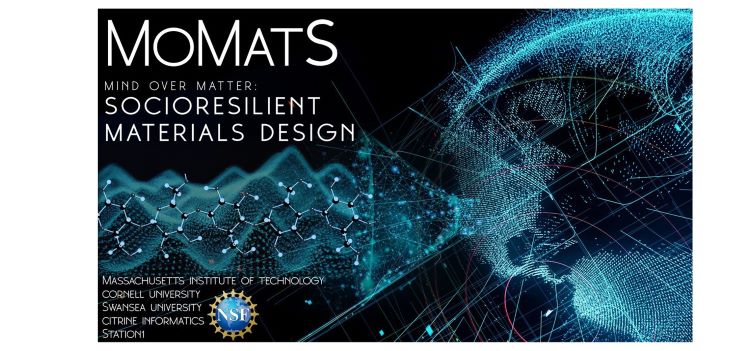
Swansea University has been awarded a research grant with the Massachusetts Institute of Technology and Cornell University, sponsored by the National Science Foundation (NSF) in a multi-institutional research project.
The successful project Mind over Matter: Socioresilient Materials Design (SMD): A New Paradigm For Addressing Global Challenges in Sustainability (MoMatS) has secured a $750,000 NSF Convergence Accelerator grant, and it is one of 16 multidisciplinary projects chosen for their work as part of its Track I: Sustainable Materials for Global Challenges programme.
Swansea is a collaborating organisation and Dr Francisco Martin-Martinez, Senior Lecturer in the Chemistry Department, will lead its involvement. The University is a member of the organisational leadership team which includes the Massachusetts Institute of Technology (Department of Materials Science and Engineering), Cornell University (Sibley School of Mechanical and Aerospace Engineering), Citrine Informatics, Inc, and Station1, a non-profit higher education institution.
The project includes 14 additional national and international collaborating organisations across sectors including academia, industry, venture capital, social sector, government, and philanthropy.
Dr Martin-Martinez said: "It is very exciting to be part of the team that has been awarded this grant, and to work with Professor Christine Ortiz, Dr Ellan Spero, Dr Jingjie Yeo, and our colleagues from Citrine Informatics on developing a new paradigm for designing more environmentally, socially, and economically sustainable and resilient materials.
“I also believe that it is important opportunity for Swansea University to participate in a collaborative grant from NSF, alongside with MIT and Cornell University.”
The research project is an innovative cross-sector and cross-disciplinary effort that aims to fundamentally rethink, reshape, redirect, and accelerate materials research and development towards more environmentally, socially, and economically sustainable and resilient materials-based products and materials-driven outcomes.
The MoMatS collaboration will involve leading researchers, scholars, and practitioners with expertise across disparate fields, including the sciences, engineering, architecture and urban planning, and the humanistic and social sciences.
Increasingly, materials infrastructure and systems are faced with climate shocks which have created and amplified environmental damage and injustice issues. The MoMatS research project will create a next-generation multidisciplinary framework for materials design through the integration of computational capabilities, rigorous humanistic and social sciences methodologies, and nature-inspired principles.
About the NSF Convergence Accelerator
Launched in 2019, the National Science Foundation’s Convergence Accelerator builds upon research and discovery to accelerate use-inspired convergence research into practical application. This unique programme, aligned to the Directorate for Technology, Innovation and Partnerships, funds a cohort of teams to work interactively toward solving grand societal challenges that impact thousands of people positively.
As part of the 2022 cohort, Track I: Sustainable Materials for Global Challenges aims to converge advances in fundamental materials science with materials design and manufacturing methods with the goal to couple their end-use and full life-cycle considerations for environmentally and economically sustainable materials and products that address global challenges.
